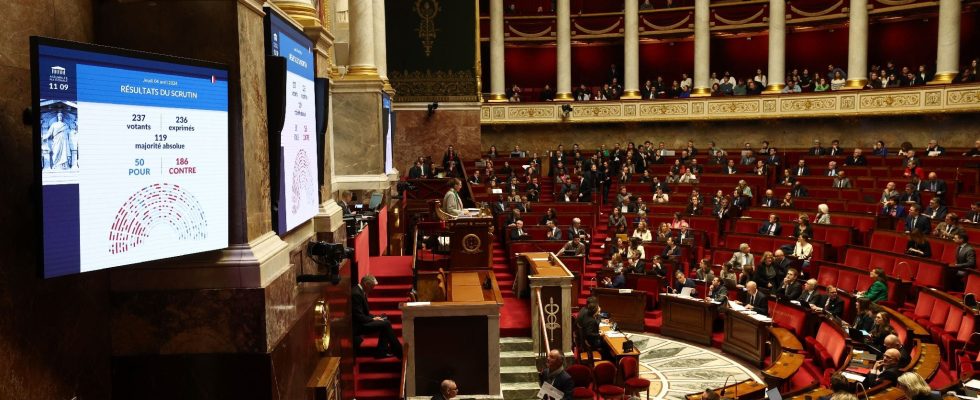Several months after the intense mobilization of the agricultural world, this is the text which is supposed to close many debates. The National Assembly begins this Tuesday, April 30 in committee the examination of the agricultural orientation bill, the government’s response to peasant anger which had crystallized like never before at the start of the year. The full name of the text, the “guidance law for sovereignty in agricultural matters and the renewal of generations in agriculture”, clearly sets out the objective: to reassure about the future of the sector, while the attractiveness of the profession of The farmer deteriorates from year to year. “Given the challenge we have of finding 200,000 farm managers within 10 to 15 years, we must bring in people who do not come from the agricultural world,” underlined the minister of Agriculture Marc Fesneau in front of journalists this Tuesday.
Rewritten under the pressure of the demonstrations, the text combines measures on training, transfers of farms, or even the “acceleration of litigation” in the event of appeal against water storage projects or construction of buildings. breeding, despite warnings from the Council of State about “constitutionality risks”.
The debates are expected to last until this weekend. More than 3,000 amendments were tabled, nearly half of them by Les Républicains. A third of the proposals, particularly on plant protection products or taxation, were however deemed inadmissible, because they were too far removed from the articles or created a financial burden for the State.
The text should then arrive in the hemicycle on May 14, for a solemn vote on the 28. “In its initial version, it is already very useful for agriculture”, argued Marc Fesneau, saying he was open to debating taxation during of the examination of the next budget in the fall. A text of law on phytosanitary products should also be presented by the summer.
“Major general interest”
In the presence of Minister Marc Fesneau, the deputies will start with the biggest piece: article 1, which makes “food sovereignty a structuring objective of public policies”. It is in particular this article which wishes to establish “agriculture, fishing and aquaculture” as being of “major general interest”.
Simple incantatory article? Not only that, judges the minister’s office, which hopes that it will “feed the reflection of the administrative judge” to resolve a dispute around an agricultural project, when it is balanced with an ecological imperative. “The hierarchy of standards would not be modified: environmental protection has a constitutional value whereas, even ‘major’, the general agricultural interest would only have legislative value”, says Didier Truchet, professor emeritus of Paris- Panthéon-Assas, in an analysis for Le club des juristes.
“If you want to make photovoltaic panels but it degrades food sovereignty, it’s still not bad to ask the question,” estimates a government source, according to whom “it’s jurisprudence” which will decide. “Either we call into question the Constitution and the Environmental Charter, or we make fun of the peasant world”, criticizes the socialist Dominique Potier, for whom the text “achieves the feat of not treating any major or marginal subject “.
The fear of a new motion to reject
It is not only the Socialist Party which does not hide its doubts about the scope of this text. For Antoine Villedieu, RN deputy, this bill “does not in any way meet the expectations of farmers”. The measures “are not at all going to respond to the challenges of the crisis”, judges David Taupiac (Liot).
“We want a text, but not small arms. We will have to strengthen it considerably”, warned the LR deputy Julien Dive, while the government is counting the votes on the right, even in the PS or among the Liot elected officials to hope an adoption. From AFP, a government source even claims to fear a scenario similar to the immigration bill, with a rejection motion voted by LR in the hemicycle, and calls for “passing a certain number of deals from the commission”.
The bill “does everything except respond to the challenge of renewing generations”, also denounces the LFI deputy Aurélie Trouvé, who will, unsurprisingly, oppose the text. In addition to the acceleration of litigation, it also denounces an article providing for conditions for investment of land capital in agricultural land. “It aims to open up land grabbing to finance,” she criticizes, affirming that this law aims to “develop agribusiness against family farming.”
Already first compromises?
Rarely, all the oppositions and even some Macronists have also tabled deletion amendments concerning this article. “We don’t want to make it a financialization. We will try to put in place guidelines to explain that it is, for example, communities that can enter into financing,” reassured Marc Fesneau. According to information from the media Contexte, the general rapporteur of the text, Eric Girardin (Renaissance), said he was ready to “rewrite” this article to avoid “any risk of financialization” of agricultural land.
On the union side, the FNSEA is favorable to the spirit of the overall text but expects other measures on taxation and pesticides, requests also made on the right. The Confédération Paysanne, the third union and located further to the left, criticizes a law which “benefits the proponents of agro-industry, by strengthening their license to pollute more” and by “simplifying the expansion of farms”.
Emmanuel Macron will receive the unions this Thursday at the Elysée, following several other commitments made last weekend, which met with a positive response from the majority unions. A sign that although mobilization has weakened in the public space, pressure still remains strong on the executive.
